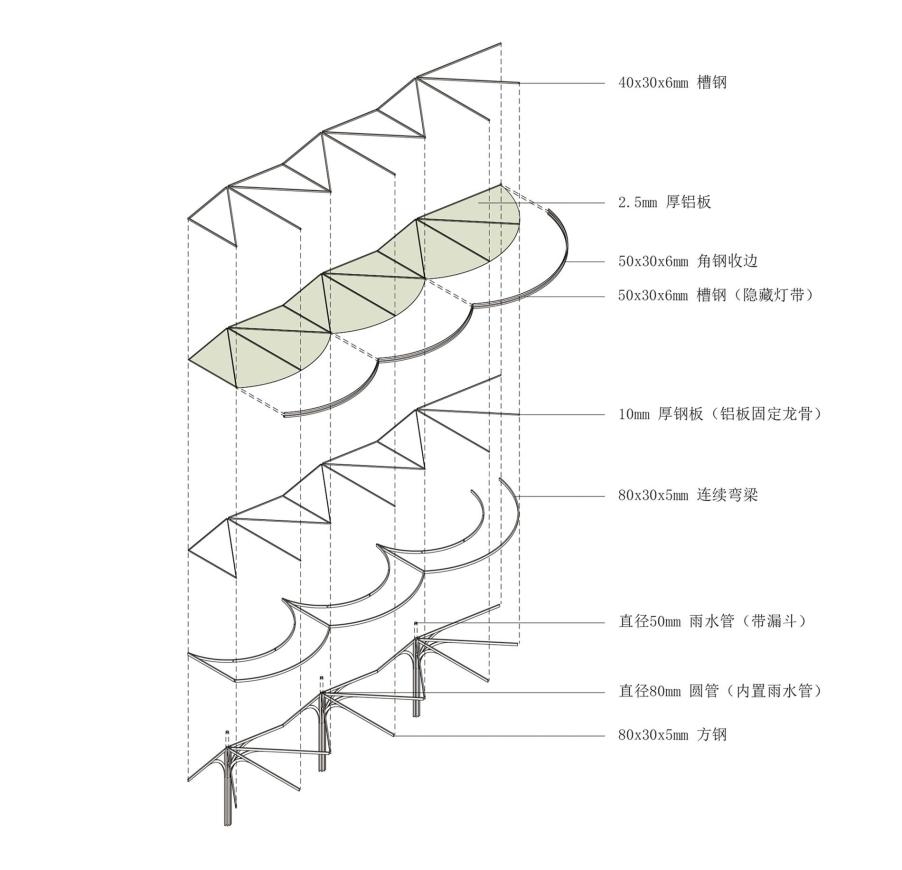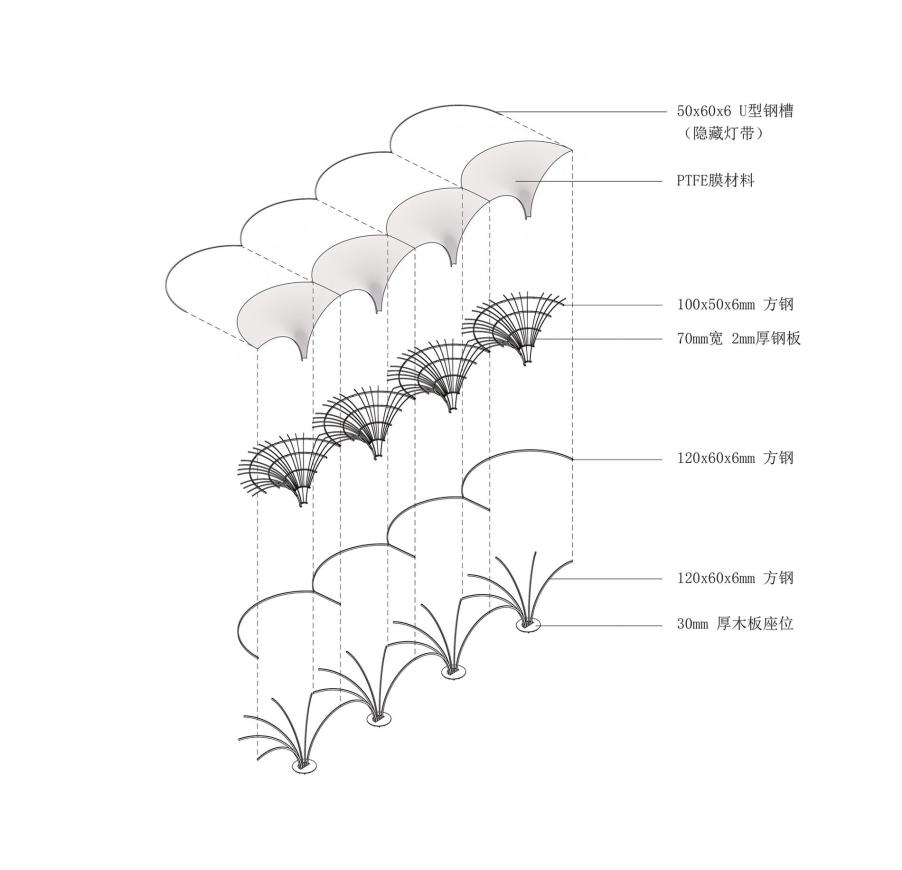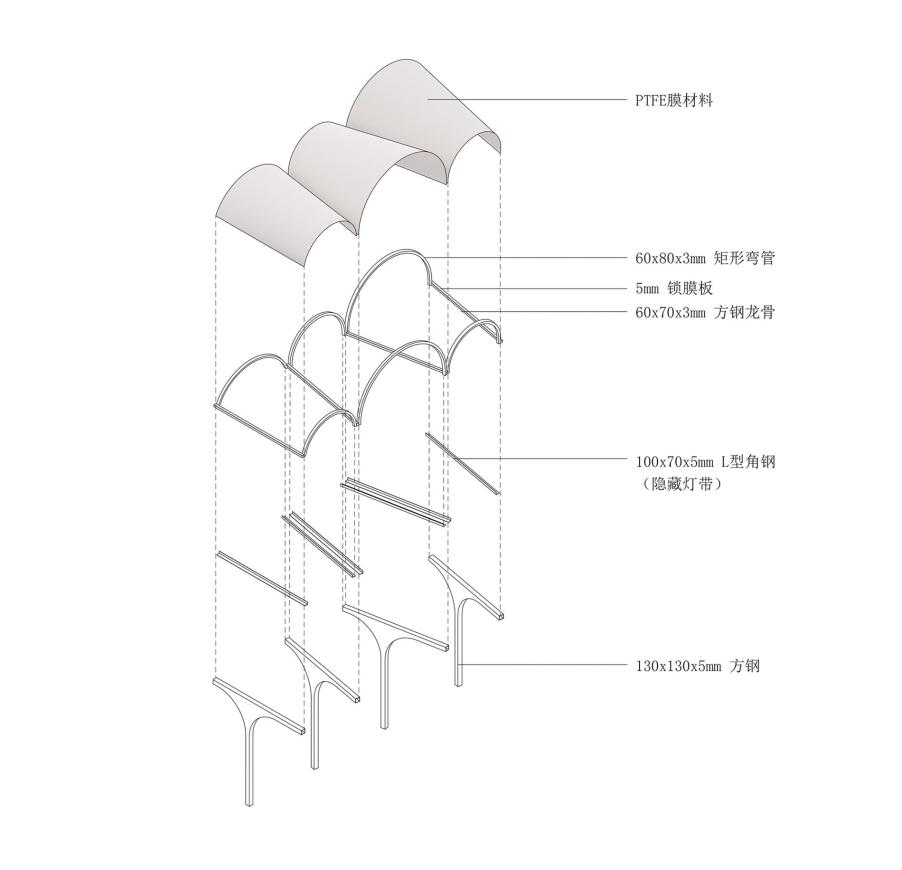本文由 竖梁社 授权mooool发表,欢迎转发,禁止以mooool编辑版本转载。
Thanks Atelier cnS for authorizing the publication of the project on mooool, Text description and images provided by Atelier cnS.
竖梁社:龙江城区中心小学(锦屏校区)位于佛山市顺德区龙江镇锦屏山麓,是龙江镇为满足中心城区日益增长的优质学位需求,利用邻近的锦屏中学旧校址改建而成的低年级校区,改造后可容纳一二年级共20个班。改造设计中充分利用原校区紧邻锦屏山鲤鱼岗公园的优势,与公园环境融合、互动,形成一个在大自然中学习的校园,营造一个“公园里的校园”和“校园里的公园”,为一二年级小朋友搭建从幼儿园到小学过渡的桥梁。
Atelier cnS:Longjiang Central Primary School (Jinping Campus) is located at the foot of Jinping Mountain, Longjiang, Foshan. It was rebuilt from the existing Jinping Middle School in order to meet the growing demands for high-quality education in the central urban area. After the renovation, the lower grade campus can accommodate 20 classes of grades one and two. The renovation takes the advantage of the site, extracting a series of natural elements from Liyugang Park in Jinping Mountain and bringing them back to the campus design. By integrating and interacting with the natural environment, a campus that learns in nature is formed. This “campus in the park” or the “park in the campus” builds a bridge for the first and second-year students to transition from kindergarten to primary school.
▽项目视频 Video
▽校园鸟瞰夜景 Aerial view

▽公园入口玻璃拱廊 Park entrance glass arcade


改造前的校园 The campus before renovation
锦屏校区位于龙江旧城镇中心,前身是龙江中学的旧校址,校园内保留至今的麻石路承载了许多龙江人的记忆,虽然有着深厚的历史底蕴,但地处拥挤的旧城区中心,也给学校带来了许多问题:
Jinping Campus is located in the center of the Longjiang Town. It used to be the site of Longjiang Middle School and the stone road preserved in the campus has carried the memories of local people. Although the old town has a profound historical background, its crowded circulation in the central district has also brought many issues to the school:
▽改造前鸟瞰 Aerial view
1、学校的临街面被两栋居民楼遮挡,导致学校对外展示面仅剩一个校门出入口,使得学校不仅没有一个良好的对外形象,如此不起眼的校园出入口在拥挤的街道上也很容易产生安全问题和交通问题。
1. The transition space in front of the school is blocked by two residential buildings, resulting in a non-obvious entrance left. It not only has a negative influence on school overall appearance, but also brings safety and traffic problems to the campus when students are entering and leaving;
▽改造前入口 Retrofit front entrance
▽改造后校园入口 The renovated campus entrance

2、校园运动场与教学楼之间存在着7米左右的落差,上下交通仅通过一条户外楼梯来解决,导致运动场与教学区之间交通极其不便。
2. There is a drop of about 7 meters between the sports grounds and the school building, and the main transition is only depend on an outdoor staircase, which makes the circulation in between extremely inconvenient.
▽改造前-登山拱廊 Before renovation – Mountaineering Arcade
▽改造后-场地高差-登山拱廊和屋顶游乐场 Modified site height difference – hiking arcade and roof playground

3、校园内教学区中庭长期作为停车场使用,在运动场可达性差的情况下,校园内优质的课间活动空间匮乏。
3. The atrium in the campus is currently underused and it has been treated as a parking lot for a long time. In the condition of poor accessibility to the sports grounds, it shows a lack of activity spaces during the break between the classes.
▽教学区中庭-改造前 Atrium of teaching area – Before renovation
▽改造后的教学区中庭 The renovated atrium of the teaching area

▽教学区中庭-白云连廊、图书城堡和登山拱廊 Teaching area atrium – white cloud corridor, book castle and mountain arcade

4、现状校舍空间难以满足学校的丰富的素质化教学需求,仍需一部分扩展空间。
4. The current school building has not meet the various demands for education, more flexible spaces are needed.
▽运动场原有建筑-改造前 Original building of sports ground – before renovation
▽运动场原有建筑-改造后 Original building of sports ground – after renovation

▽主席台-改造前 Rostrum – Before the transformation
▽主席台-改造后 Rostrum – After renovation

轻量化介入,插件式的改造 Lightweight design and the plug-in transformation
由于学校教学区建筑在20年刚刚经过了一次加固和翻新,而作为扩建场地的运动场周边,也存在着许多需要避让的大树。因此在设计之初,我们便决定采用轻介入、插件化的方式,在尊重和保留场地现有特征前提下,充分利用现有场地条件,通过一系列插件的置入,对校园进行微改造。在解决校园基本使用问题的同时,激活校园空间,提升校园品质,为校园注入新的活力和元素,重构街道——校园——公园三者之间割裂的关系。
Due to the fact that the school building has just been renovated in 2020 and there are a lot of large trees need to be preserved around the expanded sports grounds, a lightweight design and plug-in approach are adopted through the design thinking. On the premise of respecting and retaining the existing characteristics of the site, designers fully took the advantages of the existing site conditions and carefully made a micro-renovation of the campus. Via a series of renovation, basic functional spaces in the campus are optimized, underused areas are reactivated, and environmental quality is greatly improved. The lightweight design thinking not only brings new vitality into the campus, but also repairs the fragmented relationship between the street-campus-park.
▽校园鸟瞰 Aerial view

▽荷叶连廊 Lotus leaf corridor

▽森林图书馆 Forest library

同一形式母题下的演绎 Different representations of a geometric motif
在插件化改造的方式下,我们的工作也自然地从解决一系列问题转化成了设计一套“自适应”的产品,我们选择了拱这一形式母题。在相同的形式逻辑下,由于产品置入环境的不同,面对问题的不同,而产生适应性的变化,进而衍生出一系列的插件,这些插件严丝合缝地插入到原本松散无序的场地中,重构了场地的空间秩序,形成环环相扣的空间序列。
By exploring the plug-in transformation, the focus has gradually transformed from solving a series of problems to designing a set of “adaptive” blocks. Under this circumstance, designers select a motif of arches as a starting point. By following a same logic, different ‘products’ are designed to adapt to different environments and to deal with different problems. These adaptive plug-ins are perfectly inserted into the existing site, reconstructing the order between buildings and showing an interlocking spatial sequence throughout the site.
▽比选过程 Comparison process
▽拱的演变 Arch evolution
▽装置性模块 Device module
▽服务性模块 Service module
▽活动性场地 Active site
▽功能分析图 Functional analysis diagram
校园里的公园 Revitalizing outdoor spaces: park walk in the school
在校园教学区,我们保留了教学楼外立面,场地里的大树以及承载了校园历史的麻石路,然后置入一系列的插件,为校园注入活力,营造一个校园里的公园。置入校门拱廊,提升校园入口的标识性,超尺度的拱门,让校园成为街道上的一道风景,置入白云连廊,为师生遮阳避雨,同时强化中庭的围合感;置入图书城堡,利用楼梯间的闲置平台打造校园图书角;置入登山拱廊和天桥,增加通往运动场的通道,提升运动场与教学区之间的可达性,优化“登山”体验。
To preserve the original campus, designers retained the facade of existing building, the symbolic trees on the site, and the stone road that carried the history of the campus. By inserting in a series of “adaptive” blocks, the outdoor spaces are revitalized and a park walk experience is brought into the campus. The archway at the entrance is placed to enhance the sense of entering and the ‘Super Arches’ make the campus a landscape on the street. The ‘Cloud Corridor’ is placed to provide a shelter for outdoor activities and enhance the sense of enclosure in the atrium. The ‘Library Castle’ is placed in the stairwell to create a book corner around flexible spaces. The ‘Hiking Trail’ and the ‘Sky Bridge’ are placed to improve the accessibility to the sports grounds and highlight the experience of mountain climbing.
▽更新后的入口拱门 Updated entrance arch

▽白云连廊和入口拱门 White cloud corridor and entrance arch

▽白云连廊和图书城堡 White cloud corridor and book castle

▽白云连廊 White cloud corridor

▽从图书角望向对面的图书城堡 From the Book Corner looking across to the Book Castle

▽利用楼梯间闲置空间打造图书角 Use the idle space of the stairwell to create a book corner

▽登山拱廊 Mountaineering arcade

公园里的校园 Blurring boundaries: sports field in the park
在校园运动区,我们拓展了校园的边界,让树林成为学校的一部分,在树林的缝隙中见缝插针置入功能模块,引入自然教育的理念,让学生在树林中奔跑和学习。将校园延展到公园,打造公园里的校园。穿插在树林中的功能模块,为校园提供了增添了森林中的图书馆、击剑馆、活动室等第二课堂空间。环绕着运动场的各个模块,呈现出不同的立面表情,这一系列不同的景框为孩子们提供了观察大自然的新视角。
In terms of the sports grounds, designers blurred the boundaries between the campus and the parkland and brought the nature into the school. By introducing the concept of ‘study in nature’, several functional modules are lightly inserted in between the green spaces, which allow students to explore and learn in a natural environment. By blurring boundaries between the campus and the parkland, sports field are naturally blend in with the surroundings. The functional modules in the parkland fulfill the functions of library, fencing hall, activity room and other second classroom spaces. The surrounding modules in the sports grounds, present a range of facades and frame different perspectives of nature, so that the students can explore the beauties of nature while studying.
▽活动空间 Activity space


▽森林图书馆 Forest library









▽森林图书馆室内 Interior of forest library



▽白石击剑馆 Shiraishi Fencing Hall



幼小衔接校园 Bridging the gap between kindergarten and primary school
作为一个幼小衔接的低年级校园,我们努力地尝试着在设计中加入一些可读性更强的形式语言,通过抽象的图像语言激发小朋友对于形式和空间的想象力,避免采用一些过于低龄化,没有想象空间的具象图形,也摒弃过于严肃、晦涩的建筑语汇,让小朋友在校园中感受到更强的参与感和代入感。因此在标识系统的设计中,我们采用了也更多的图像来辅助文字的阅读,比如在班牌的设计中,便采用了两种形式的花朵来代表两个不同的年级,不同的功能课室,也都加入了可读性较强的LOGO增强不同功能之间的可识别性。
As a period of transition from the kindergarten to the higher grade, designers combine the written language and the graphic language through the signage system, to stimulate students’ imagination and help them to understand the specific function. For example, in the design of the signage system, designers used two forms of flowers to represent two different grades and a more readable LOGO is also applied to make the different functional classrooms distinguishable.
▽标识设计 Logo design

▽标识系统应用 Identification system application


校园记忆场所的打造 The place to preserve memories
校园就是一本最好的教材,在我们的校园设计中,我们始终希望能够在校园中营造出属于这座校园的记忆场所,戏剧性的入口拱门,光影斑驳的玻璃拱廊,森林中的图书馆以及被学生们称为小巨蛋的击剑馆,希望这些场所未来能为锦屏校区的每一届师生留下一些美好的校园记忆。
The campus is the best book. Through the design process, designers eager to create a particular space that can store memories and give students a sense of belonging in campus. Such as the dramatic entrance arches, the glass corridor that is showing subtle gradations of light and shade, a library hidden in the park, and the fencing hall, which is called the ‘Little Arena’ by the students. It is hoped that these places will preserve the most precious memories for everyone in Jinping Campus in the future.
▽从公园活动亭看向校园 View of the campus from the park pavilion

▽总平图 Plan
▽首层平面 First floor plan
▽剖面图 Section
▽立面图 Elevation plan
▽轴测结构分析 Axonometric structure analysis
▽箱体立剖 Box split
项目名称:轻量化介入 | 锦屏山麓小学低年级校区微改造
设计公司:广州市竖梁社建筑设计有限公司
公司官网:http://www.ateliercns.com/
项目状态:已建成(2022)
项目位置:佛山市顺德区龙江镇
项目规模:建筑面积 19210㎡
主创设计:竖梁社
主持建筑师:钟冠球,朱志远,宋刚
项目负责人:林海锐
设计团队
方案设计团队:
竖梁社B组:梁文朗、肖文菁、蔡雅倩、黄文轩、林东燕、杨培彦、陈少鹏
导视设计团队:
竖梁社悬亮子工作室:莫石峰,简秋怡
结构设计团队:
竖梁社钢砼工作室:孙晓民,郑梓茂
摄影师:吴嗣铭
Project name:Lightweight Interventions | Renovation of the Jinping Lower Primary School
Design Company: Atelier cnS
Website: http://www.ateliercns.com/
Project Status: Completed
Project location:Longjiang Town, Shunde District, Foshan City, Guangdong
Project scale:Building area 19210㎡
Main creator Design: Atelier cnS
Presiding Architects: Guanqiu Zhong, ZhiYuan Zhu, Gang Song
Project Leader: Hairui Lin
Architectural Design
Atelier cnS Group B: Wenlang Liang, Wenjing Xiao, Yaqian Cai, Wenxuan Huang, Dongyan Lin, Peiyan Yang, Shaopeng Chen
Signage Design:
Cicada Art: Shifeng Mo, Qiuyi Jian
Structural Design Team:
S&C DESIGN: Xiaomin Sun, Zimao Zheng
Clients: Government of Longjiang Town,Shunde District, Foshan City
Photographer: Siming Wu
“ 设计将学校与公园环境融合、互动,形成一个在大自然中学习的校园,营造一个“公园里的校园”和“校园里的公园”。”
审稿编辑: Maggie
更多 Read more about: 竖梁社建筑设计

























运动场建筑和主席台图片放反了